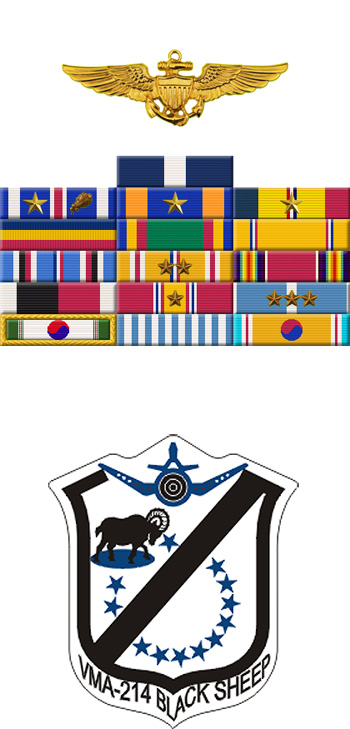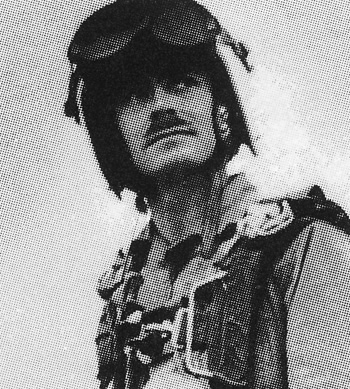
|
John F. Bolt, Jr. |
 |
|||
| Rank, Service | ||||
Lieutenant Colonel O-5, U.S. Marine Corps |
||||
| Veteran of: | ||||
|
||||
| Tribute: | ||||
John Bolt was born on May 19, 1921, in Laurens, South Carolina. He enlisted in the Aviation Cadet Program of the U.S. Navy on August 28, 1941, and was commissioned a 2d Lt in the U.S. Marine Corps and designated a Naval Aviator on August 21, 1942. Bolt then served as an instructor pilot at NAS Jacksonville, Florida, from August 1942 to April 1943, before deploying to the South Pacific in June 1943 and joining VMF-214, the Black Sheep Squadron, and then VMF-211, where he served until May 1944. During this time, Capt Bolt was credited with destroying 6 Japanese aircraft in aerial combat. His next assignment was with VMF-471 at MCAS El Toro, California, from May to November 1944, followed by Aviation Ground Officer's School at MCS Quantico, Virginia, from November 1944 to February 1945. Capt Bolt then returned to VMF-471 until March 1945, when he joined VMF-215. Between World War II and the Korean War, he served with VMF-472, MASG-46, CASD-11, VMF-512, VMF-323, VMF-312, VMF-452, and MAG-12. Maj Bolt served with VMF-224 at MCAS Cherry Point, North Carolina, from May 1950 to April 1951, and then on the staff of the 2nd Marine Aircraft Wing at Cherry Point until September 1951. He was assigned to the Air Force flying F-86 Sabre fighters with the 318th Fighter Interceptor Squadron at McChord AFB, Washington, from September 1951 to October 1952, and then deployed to Korea where he flew F9F Panthers with VMF-115 and F-86 Sabres with the Air Force's 39th Fighter Interceptor Squadron from November 1952 to July 1953. During this time, he was credited with shooting down another 6 enemy aircraft, for a total of 12 in two wars, one of only 7 Americans to be an ace in two wars. This also made him the only Naval Aviator to become an Ace in two wars, a record which stands to this day. After Korea, Col Bolt served with Headquarters U.S. Marine Corps at the Pentagon from September 1953 to June 1956, and after attending school at MCS Quantico, he served with MAG-13 at MCAS Kaneohe Bay, Hawaii, from August to November 1957, and then as Commanding Officer of VMA-214 from November 1957 to August 1959. He then served on the staff of MAG-13 from August 1959 to June 1960, before attending helicopter training at NAS Pensacola, Florida, from June to August 1960. Col Bolt's final assignment was in the Instructor Senior School (Air Section) at MCS Quantico, where he served from August 1960 until his retirement from the Marine Corps on March 31, 1962. After retiring from the Marine Corps, John went to Law School at the University of Florida, and practiced law for many years before retiring in 1991. He died on September 8, 2004. |
||||
|
||||

